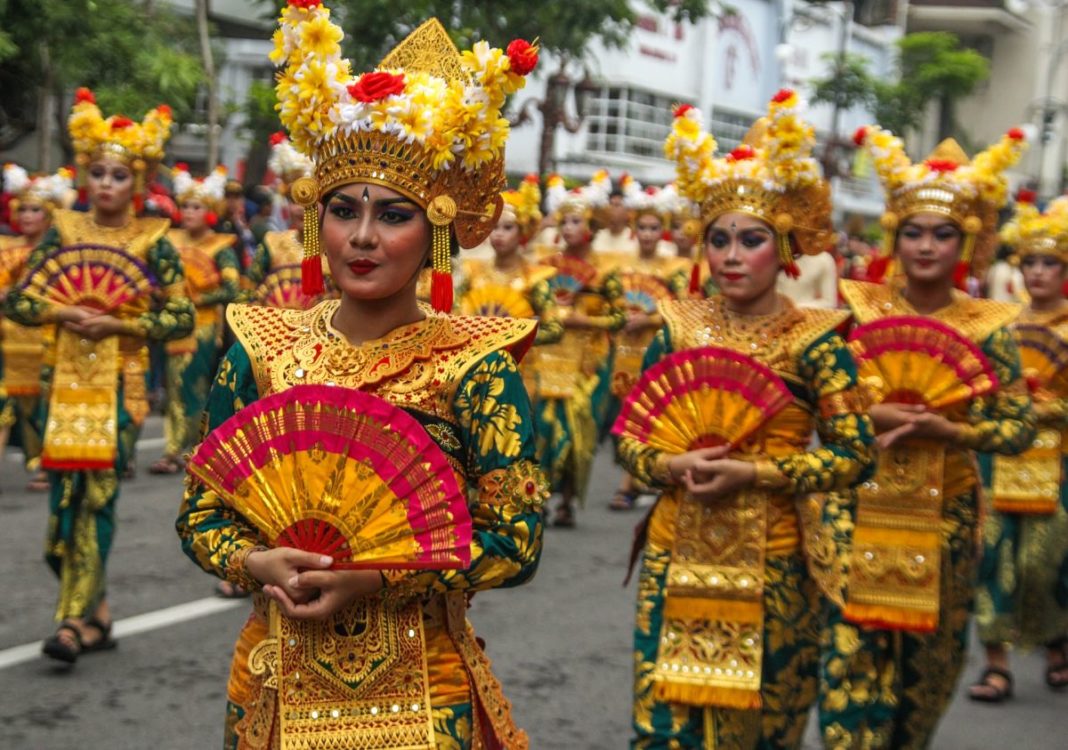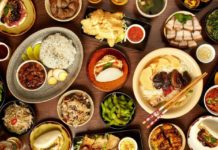Indonesian lifestyle is influenced by the country’s diverse culture, traditions, and geography. As the world’s largest archipelago, Indonesia is home to numerous ethnic groups with their own unique customs and ways of living. Here are some aspects of the Indonesian lifestyle:
- Family-oriented: Family plays a central role in Indonesian culture, and family ties are highly valued. Many Indonesians live in extended family households, where several generations often reside together under one roof. Family gatherings and celebrations are important occasions for Indonesians, and there is a strong emphasis on respecting and supporting elders.
- Family is considered extremely important in Indonesian culture, and family ties are highly valued. It is common for multiple generations to live together in extended family households, and family members often support each other in various aspects of life. Family gatherings and celebrations, such as weddings, religious festivals, and other special occasions, are significant events in Indonesian culture. They provide opportunities for family members to come together, bond, and strengthen their relationships. Respecting and supporting elders, including grandparents and other older family members, is a fundamental value in Indonesian society, and their wisdom and guidance are highly regarded. Family is often considered the backbone of Indonesian society, and maintaining strong family bonds is an important part of the Indonesian lifestyle.
- Religiously diverse: Indonesia is known for its religious diversity, with the majority of the population practicing Islam, but also significant populations of Christians, Hindus, Buddhists, and others. Religion often plays a significant role in daily life, with religious practices, customs, and rituals influencing many aspects of the Indonesian lifestyle, including social interactions, festivities, and daily routines.
- Indonesia is known for its religious diversity, with the majority of the population practicing Islam, making it the world’s most populous Muslim-majority country. However, Indonesia is also home to significant populations of Christians, Hindus, Buddhists, and others, making it a country with diverse religious practices and customs.
- Religion holds a significant role in the Indonesian lifestyle and influences many aspects of daily life. Religious practices, customs, and rituals are deeply ingrained in Indonesian culture and are observed by people from various religious backgrounds. Social interactions, festivities, and daily routines are often influenced by religious beliefs and traditions.
- For example, Muslims in Indonesia observe daily prayers, fasting during the holy month of Ramadan, and celebrating Islamic festivals such as Eid-al-Fitr and Eid-al-Adha. Christians may attend church services, participate in Christian festivals such as Christmas and Easter, and Hindus may perform religious ceremonies, visit temples, and celebrate Hindu festivals such as Galungan and Nyepi. Similarly, Buddhists may engage in meditation, visit temples, and participate in Buddhist festivals such as Vesak.
- Religion also plays a role in shaping Indonesian art, architecture, and cuisine. Many traditional dances, music, crafts, and other forms of cultural expression are influenced by religious beliefs and practices. For example, traditional Balinese dance and music often incorporate Hindu mythology, and Islamic calligraphy and geometric patterns can be found in Indonesian architecture and crafts.
- Furthermore, religious tolerance and respect for different faiths are important values in Indonesian culture. Despite the country’s religious diversity, Indonesians generally coexist peacefully and respect each other’s religious beliefs and practices. Interfaith harmony and cooperation are promoted, and many Indonesians participate in religious activities of different faiths, further reflecting the religious inclusiveness of the Indonesian lifestyle.
- It’s important to note that while religion plays a significant role in the Indonesian lifestyle, it is just one aspect of the diverse and dynamic culture of Indonesia, and people of different religious backgrounds often share many common cultural practices, traditions, and values that are not necessarily tied to any specific religion.
- Traditional arts and culture: Indonesia has a rich and diverse cultural heritage, with various traditional arts and cultural practices that are passed down from generation to generation. This includes traditional dances, music, crafts, batik (a traditional fabric art), wayang kulit (shadow puppetry), and various rituals and ceremonies that are unique to different regions and ethnic groups in Indonesia.
- Indonesia has a rich and diverse cultural heritage with a wide range of traditional arts and cultural practices that are passed down from generation to generation. These cultural expressions are unique to different regions and ethnic groups in Indonesia, and they contribute to the country’s vibrant cultural tapestry.
- Traditional Dances: Indonesia is known for its diverse range of traditional dances, each with its own distinct movements, music, costumes, and meanings. For example, Balinese dancers, such as Legong, Barong, and Kecak, are known for their elaborate costumes, intricate movements, and dramatic storytelling. Javanese dances like Ramayana and Bedhaya are known for their refined and graceful movements. In contrast, dances from Sumatra, such as Randai and Saman, are characterized by their energetic and dynamic performances.
- Traditional Music: Indonesia has a rich tradition of music, ranging from gamelan, a traditional ensemble of percussion instruments, to traditional folk music played with various string, wind, and percussion instruments. Each region in Indonesia has its own unique musical traditions, such as Sundanese angklung, Javanese gamelan, Balinese gamelan gong kebyar, and Torajan sa’dan.
- Traditional Crafts: Indonesian traditional crafts are known for their intricacy and craftsmanship. From batik, a traditional fabric art using wax-resist dyeing techniques, to ikat, a form of tie-dye weaving, and wood carvings, metalwork, and pottery, Indonesia has a rich tradition of craftsmanship that is passed down through generations.
- Wayang Kulit: Wayang Kulit is a traditional form of shadow puppetry that is popular in Java and Bali. It involves the use of intricately carved leather puppets, manipulated by a puppeteer behind a backlit screen, accompanied by traditional music and storytelling. Wayang Kulit performances often depict scenes from Hindu epics such as Ramayana and Mahabharata and are considered both an art form and a cultural expression.
- Rituals and Ceremonies: Indonesia is known for its diverse rituals and ceremonies that are unique to different regions and ethnic groups. For example, the Toraja people in Sulawesi are known for their elaborate funeral ceremonies, while the Balinese people have a rich tradition of religious ceremonies, such as Galungan and Nyepi. These rituals and ceremonies often involve music, dance, elaborate costumes, offerings, and other cultural elements.
- Overall, Indonesia’s rich and diverse cultural heritage is an integral part of the country’s identity, and these traditional arts and cultural practices continue to thrive and evolve, passing on the unique cultural legacy from one generation to another.
- Hospitality and community-oriented: Indonesians are known for their warm hospitality and friendliness towards guests. There is a strong sense of community and togetherness in Indonesian culture, with neighbors often looking out for each other and lending a helping hand when needed. Community gatherings, such as neighborhood events and religious gatherings, are common and provide opportunities for socializing and building relationships.
- Indonesian culture is known for its warm hospitality and friendliness toward guests. Indonesians place a high value on community and togetherness, and there is a strong sense of kinship and camaraderie among neighbors, friends, and even strangers. This sense of community is reflected in various aspects of daily life in Indonesia.
- Hospitality: Indonesians are known for their warm and welcoming nature towards guests. It is common for Indonesians to open their homes to visitors and offer them food and drinks. Hosting guests is seen as a form of honor and is considered an important part of Indonesian culture. Indonesians are often eager to share their culture, traditions, and stories with guests, and visitors are typically treated with kindness and respect.
- Sense of Community: Indonesians have a strong sense of community, and neighbors often look out for each other and provide help and support when needed. Community gatherings, such as neighborhood events, religious gatherings, and social activities, are common and provide opportunities for socializing, building relationships, and strengthening community bonds. Indonesians often come together to celebrate festivals, weddings, and other important occasions as a community, fostering a sense of togetherness and unity.
- Socializing and Building Relationships: Socializing and building relationships are highly valued in Indonesian culture. Indonesians often take time to connect with others, engage in small talk, and show genuine interest in each other’s lives. Building and maintaining social relationships, whether it’s with family, friends, colleagues, or neighbors, is considered important and is often prioritized in daily life.
- Helping and Supporting Others: Indonesians have a strong sense of mutual support and helping others in need. It is common for Indonesians to offer help and assistance to those facing challenges or difficulties. This can range from simple acts of kindness, such as offering a helping hand to a neighbor or a stranger, to providing support during times of crisis or adversity.
- Overall, the strong sense of community and togetherness in Indonesian culture fosters warm hospitality, friendliness towards guests, and a willingness to help and support others. These cultural values contribute to the welcoming and inclusive nature of Indonesian society.
- Outdoor-oriented: With its tropical climate and beautiful landscapes, Indonesia offers a wide range of outdoor activities that are popular among Indonesians. This includes beach activities, hiking, camping, and exploring natural attractions such as volcanoes, rainforests, and rice terraces. Outdoor recreation and nature appreciation are often part of the Indonesian lifestyle, with many people enjoying spending time outdoors and staying connected to nature.
- Indonesia’s tropical climate and diverse landscapes offer a wide range of outdoor activities that are popular among Indonesians. Indonesians have a deep appreciation for nature and the outdoors, and outdoor recreation is often a part of their lifestyle.
- Beach Activities: Indonesia is known for its stunning beaches and coastal areas, and beach activities such as swimming, snorkeling, diving, surfing, and sunbathing are popular among Indonesians. Many Indonesians live in coastal areas or near beaches, and spending time at the beach is a common way to relax, socialize, and enjoy the natural beauty of the country.
- Hiking and Camping: Indonesia is home to numerous mountains, volcanoes, and national parks, providing ample opportunities for hiking and camping. Indonesians enjoy outdoor adventures and often go hiking and camping in the mountains or national parks to explore the natural beauty, challenge themselves physically, and enjoy the fresh air and scenic landscapes.
- Exploring Natural Attractions: Indonesia is known for its diverse natural attractions, including rainforests, rice terraces, waterfalls, lakes, and coral reefs. Many Indonesians enjoy exploring these natural wonders through activities such as jungle trekking, bird watching, river rafting, or snorkeling and diving in coral reefs. Nature appreciation and conservation are important values in Indonesian culture, and many Indonesians take pride in the natural beauty of their country.
- Traditional Activities in Nature: Indonesians also have a strong connection to their traditional activities that are often performed in natural settings. For example, traditional farming practices, such as rice planting or harvesting, are still an important part of the Indonesian rural lifestyle and are often carried out in natural surroundings like rice terraces. Traditional fishing, boat making, and other traditional activities are also popular in certain regions of Indonesia, providing a unique cultural experience that is intertwined with nature.
- Outdoor recreation and nature appreciation are indeed an important part of the Indonesian lifestyle. The beautiful landscapes and rich biodiversity of Indonesia offer ample opportunities for outdoor activities that allow Indonesians to connect with nature, enjoy the outdoors, and appreciate the natural beauty of their country.
- Culinary culture: Indonesian cuisine is a significant part of the Indonesian lifestyle, with a rich culinary culture that varies across different regions. Eating together with family and friends is a social activity that is highly valued, and Indonesians take pride in their diverse and flavorful cuisine, which includes a wide variety of dishes made from local ingredients, spices, and traditional cooking techniques.
- Indonesian cuisine is a significant part of the Indonesian lifestyle and culture. It is known for its rich and diverse flavors, aromatic spices, and unique cooking techniques that vary across different regions of the country. Indonesian cuisine reflects the country’s cultural diversity, history, and geography, with influences from various ethnic groups, religions, and foreign traders.
- Eating together with family and friends is highly valued in Indonesian culture, and meals are often considered as social activities that bring people together. Indonesians take pride in their cuisine and the diverse range of dishes that are made from local ingredients, spices, and traditional cooking techniques.
- Some popular dishes in Indonesian cuisine include:
- Nasi Goreng: Fried rice with a variety of ingredients such as eggs, vegetables, and meat or seafood, seasoned with spices and sweet soy sauce.
- Sate (Satay): Skewered and grilled meat or seafood served with a flavorful peanut sauce and rice cakes.
- Rendang: A slow-cooked beef dish in coconut milk and spices, known for its rich and tender flavors.
- Gado-Gado: A mixed vegetable salad with peanut sauce, tofu, and boiled eggs.
- Soto: A traditional Indonesian soup with meat, vegetables, and noodles, flavored with spices and served with rice.
- Sambal: A spicy chili sauce made with various ingredients such as chili peppers, shrimp paste, and lime, used as a condiment in many Indonesian dishes.
- Nasi Padang: A type of Indonesian cuisine that originates from the Padang region of Sumatra, known for its rich and flavorful dishes, often served with steamed rice.
- Martabak: A popular Indonesian street food, which is a thick pancake filled with various fillings such as minced meat, vegetables, and eggs.
- Bakso: Indonesian meatballs are often served in a flavorful broth with noodles, vegetables, and condiments.
- Tempeh: A traditional Indonesian food made from fermented soybeans, rich in protein and commonly used in various dishes.
- Indonesian cuisine is diverse and reflects the country’s cultural heritage, geography, and availability of local ingredients. It is a source of pride for Indonesians and is an important part of their lifestyle, with meals being social occasions that bring families and friends together to enjoy the rich flavors and aromas of Indonesian cuisine.
- Rapid urbanization: Indonesia is experiencing rapid urbanization, with many people moving to cities for better economic opportunities. Urban lifestyle in Indonesia is often characterized by a faster pace of life, with modern amenities, technology, and Western influences shaping urban living. However, traditional values and cultural practices are still prevalent in many urban areas, creating a unique blend of old and new in the Indonesian urban lifestyle.
- Rapid urbanization is changing the lifestyle of many Indonesians as more people move to cities in search of better economic opportunities. Urban lifestyle in Indonesia is often characterized by a faster pace of life compared to rural areas, with modern amenities, technology, and Western influences shaping urban living.
- In urban areas, people often have access to modern infrastructure, such as well-developed transportation systems, modern buildings, and technological advancements. Western influences, including fashion, music, and entertainment, are often prevalent in urban areas, especially among the younger generation.
- However, despite modernization and Western influences, traditional values and cultural practices still hold significant importance in many urban areas of Indonesia. Indonesians, even in urban settings, often maintain strong connections to their cultural heritage, including language, customs, and traditions. Many urban Indonesians still practice religious rituals and participate in cultural events and festivities that are rooted in their traditional beliefs.
- Family values and community ties are still important in the urban lifestyle of Indonesia. Although urban living may have a faster pace of life, many Indonesians still prioritize spending time with family and friends, and community gatherings and social events remain important occasions for socializing and building relationships.
- The blend of old and new in the Indonesian urban lifestyle creates a unique cultural dynamic where traditional values and modern influences coexist, shaping the way people live, work, and interact in urban areas. Indonesians in urban areas often navigate between modernity and tradition, finding a balance between the fast-paced urban lifestyle and the cultural heritage that is deeply rooted in their identity.
These are some key aspects of the Indonesian lifestyle, which is influenced by the country’s cultural diversity, traditions, family-oriented values, and natural surroundings.




